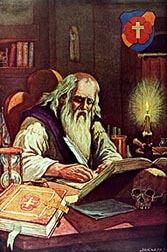Rosicrucianism





Rosicrucianism is a spiritual and cultural movement which arose in Europe in the early 17th century. The movement's manifesto was first published in 1614, with the release of the Fama Fraternitatis Rosae Crucis, followed by two other manifestos. Rosicrucianism is built on esoteric truths of the ancient past, which, concealed from the average man, provide insight into nature, the physical universe, and the spiritual realm. It has influenced the realms of philosophy, alchemy, science, and theology, intertwining with various aspects of Western esoteric tradition.
History[edit]
The origins of Rosicrucianism are subject to speculation. The movement announced itself to the world with the publication of the Fama Fraternitatis Rosae Crucis (The Fame of the Brotherhood of the Rosy Cross) in 1614. This was followed by the Confessio Fraternitatis (The Confession of the Brotherhood of the Rosy Cross) in 1615, and the Chymical Wedding of Christian Rosenkreutz in 1616. These manifestos proclaimed a "universal reformation of mankind", through a science allegedly kept secret for decades until the intellectual climate might receive it.
Beliefs and Practices[edit]
Rosicrucian beliefs and practices are a blend of mystical, philosophical, and religious elements. They emphasize the inner, spiritual development of the individual. This development is said to be attainable through the study of nature, the arts, alchemy, and the symbolic interpretation of the Bible. Rosicrucians claim to offer knowledge regarding the nature of the universe, the immortality of the soul, and the powers latent in humans.
Influence[edit]
The influence of Rosicrucianism has been significant in the development of Western esoteric traditions. Its symbols, such as the Rosy Cross, have been widely adopted by later esoteric movements. Rosicrucianism has also been linked to the development of modern Freemasonry, with some Masonic rites incorporating Rosicrucian symbols and ideas. Furthermore, its impact can be seen in the arts, literature, and some scientific disciplines, as it promoted a holistic view of the world that integrated science and spirituality.
Modern Rosicrucian Groups[edit]
Today, several organizations claim to be the heirs to the original Rosicrucian tradition. These include the Ancient Mystical Order Rosae Crucis (AMORC), the Rosicrucian Fellowship, and the Lectorium Rosicrucianum. Each of these groups offers teachings and practices they claim derive from the ancient Rosicrucian wisdom, adapted to contemporary spiritual needs.
Criticism and Controversy[edit]
Throughout its history, Rosicrucianism has faced criticism and skepticism. Critics argue that the historical evidence for the movement's early existence is thin, suggesting that the manifestos could be a hoax or satire. Despite these controversies, Rosicrucianism has endured as a significant and influential spiritual tradition.

This article is a spirituality-related stub. You can help WikiMD by expanding it!
Ad. Transform your life with W8MD's Budget GLP-1 injections from $75


W8MD offers a medical weight loss program to lose weight in Philadelphia. Our physician-supervised medical weight loss provides:
- Weight loss injections in NYC (generic and brand names):
- Zepbound / Mounjaro, Wegovy / Ozempic, Saxenda
- Most insurances accepted or discounted self-pay rates. We will obtain insurance prior authorizations if needed.
- Generic GLP1 weight loss injections from $75 for the starting dose.
- Also offer prescription weight loss medications including Phentermine, Qsymia, Diethylpropion, Contrave etc.
NYC weight loss doctor appointmentsNYC weight loss doctor appointments
Start your NYC weight loss journey today at our NYC medical weight loss and Philadelphia medical weight loss clinics.
- Call 718-946-5500 to lose weight in NYC or for medical weight loss in Philadelphia 215-676-2334.
- Tags:NYC medical weight loss, Philadelphia lose weight Zepbound NYC, Budget GLP1 weight loss injections, Wegovy Philadelphia, Wegovy NYC, Philadelphia medical weight loss, Brookly weight loss and Wegovy NYC
|
WikiMD's Wellness Encyclopedia |
| Let Food Be Thy Medicine Medicine Thy Food - Hippocrates |
Medical Disclaimer: WikiMD is not a substitute for professional medical advice. The information on WikiMD is provided as an information resource only, may be incorrect, outdated or misleading, and is not to be used or relied on for any diagnostic or treatment purposes. Please consult your health care provider before making any healthcare decisions or for guidance about a specific medical condition. WikiMD expressly disclaims responsibility, and shall have no liability, for any damages, loss, injury, or liability whatsoever suffered as a result of your reliance on the information contained in this site. By visiting this site you agree to the foregoing terms and conditions, which may from time to time be changed or supplemented by WikiMD. If you do not agree to the foregoing terms and conditions, you should not enter or use this site. See full disclaimer.
Credits:Most images are courtesy of Wikimedia commons, and templates, categories Wikipedia, licensed under CC BY SA or similar.
Translate this page: - East Asian
中文,
日本,
한국어,
South Asian
हिन्दी,
தமிழ்,
తెలుగు,
Urdu,
ಕನ್ನಡ,
Southeast Asian
Indonesian,
Vietnamese,
Thai,
မြန်မာဘာသာ,
বাংলা
European
español,
Deutsch,
français,
Greek,
português do Brasil,
polski,
română,
русский,
Nederlands,
norsk,
svenska,
suomi,
Italian
Middle Eastern & African
عربى,
Turkish,
Persian,
Hebrew,
Afrikaans,
isiZulu,
Kiswahili,
Other
Bulgarian,
Hungarian,
Czech,
Swedish,
മലയാളം,
मराठी,
ਪੰਜਾਬੀ,
ગુજરાતી,
Portuguese,
Ukrainian